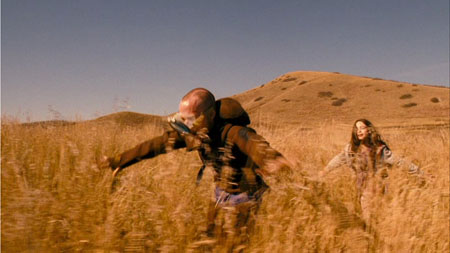DIRECTED BY: Tim Burton
FEATURING: Mia Wasikowska, Johnny Depp, the head of Helena Bonham Carter, Crispin Glover, voices of Stephen Fry and Christopher Lee
PLOT: About to be proposed to by a doltish fop, Alice excuses herself to tumble down a rabbit hole where she learns she has been chosen to slay the Jabberwock[y].

WHY IT WON’T MAKE THE LIST: Not weird enough. Burton, perhaps fearful of angering the gravy-train drivers at Disney, dims down the absurdity in this version of Alice, recasting the tale as an epic fantasy war fought by a cast of weirdos.
COMMENTS: Alice in Wonderland (which should have been titled Alice in Underland, if anyone had been paying attention) is a good-looking film with a few positives, but a recycled story that’s far from enchanting. The candy-colored visuals are as top-notch as expected, with plenty of little details to soak in: look for a dragonfly-sized flying rocking horse and a moat with floating stones that appear to be petrified severed heads. Helena Bonham Carter’s macrocephalic visage is almost worth the price of admission, and her performance as the Red Queen is suitably comic and imperious. But the story—ouch! Alice’s previous visit to Wonderland—oops, make that Underland, as it’s denizens insist it’s properly called—nine years ago was real, but she’s forgotten it for some reason, which is fine because her past adventures served no purpose whatsoever. In this sequel, the poem “Jabberwocky” is a prophecy that predicts Alice will find the vorpal blade and snicker-snack it into the neck of the dreaded Jabberwock(y) on Frabjous Day. The Mad Hatter reads the verse word for word to the disbelieving Alice, neither of them noticing that the lines refer to a “beamish boy;” Alice may be beamish, but she’s no boy. But who cares about such details? They can’t even get the monster’s name right after reading it off the page: everyone refers to the Jabberwock as the “Jabberwocky” (which is like calling Odysseus “Odyssey”). We may wonder about such inconsistencies, but such uffish considerations only matter in a tightly constructed nonsense world like Wonderland; we’re in Underland, and here there are quirky companions to collect before galumphing off to slay dragons with magical swords. Burton’s non-nonsense epic fantasy plays like an original concept by Lewis Carroll that’s been script doctored by J.R.R. Tolkien, then sent back by the corporate suits to add more fight scenes to appeal to boys and a feminist moral about self-actualization for the girls. Despite the occasional chase scene by a pack of guards who look as much like Terminator robots as playing cards, curiously, for the most part the early story plays out much as in Carroll’s tale. Alice retraces her steps, eating and drinking shrinking and growing potions and cakes and meets a hookah smoking Caterpillar. The Cheshire Cat directs her to a mad tea party. But things get less and less curiouser and more and more familiarer as the tale continues. It turns out that the tea party really isn’t mad, it’s just a ruse by the Resistance to avoid detection by the authorities. Johnny Depp’s Mad Hatter isn’t mad either (and certainly not bonkers); perhaps he’s slightly perturbed, but his faculties are all about him as leads the fight for freedom, even taking up a sword for the final battle. I have no problem with taking liberties with Carroll’s tone and story, but if you’re going to depart from the original you should replace it with something interesting, not just a generic fantasy quest rehash. Nick Willing’s Alice, with it’s human “oysters” being drained of their emotions, tapped into a more cusiously skewed Alice scenario. It’s a shame that that premise couldn’t have been matched to this budget. Tim Burton’s Alice isn’t bad, it’s just forgettable—something that could only happen in Underland, not Wonderland.
To some extent, Burton may be the victim of high expectations. Carroll and Burton seemed the perfect match, and there were high hopes that this material might allow Tim to return to the glory days of Beetlejuice, Edward Scissorhands and The Nightmare Before Christmas, when his fantasies managed to tap the popular consciousness while still dripping with edgy originality. Those of us who got our hopes up should have recognized that Alice in Wonderland is a kids’ movie intended as a blockbuster; Disney isn’t about to let Burton take chances with the story. His commission directed him to deliver Tim Burton visuals inside a safe script, and that’s what he did. The movie works fine for the little ones, but offers little to adults besides eye candy and a couple of chuckles. If Burton’s going to bounce back (and I’m starting to doubt he ever will), we’ll have to wait until he feels like he’s finally garnered enough dough and Hollywood validation to start taking chances again.
WHAT THE CRITICS SAY:





